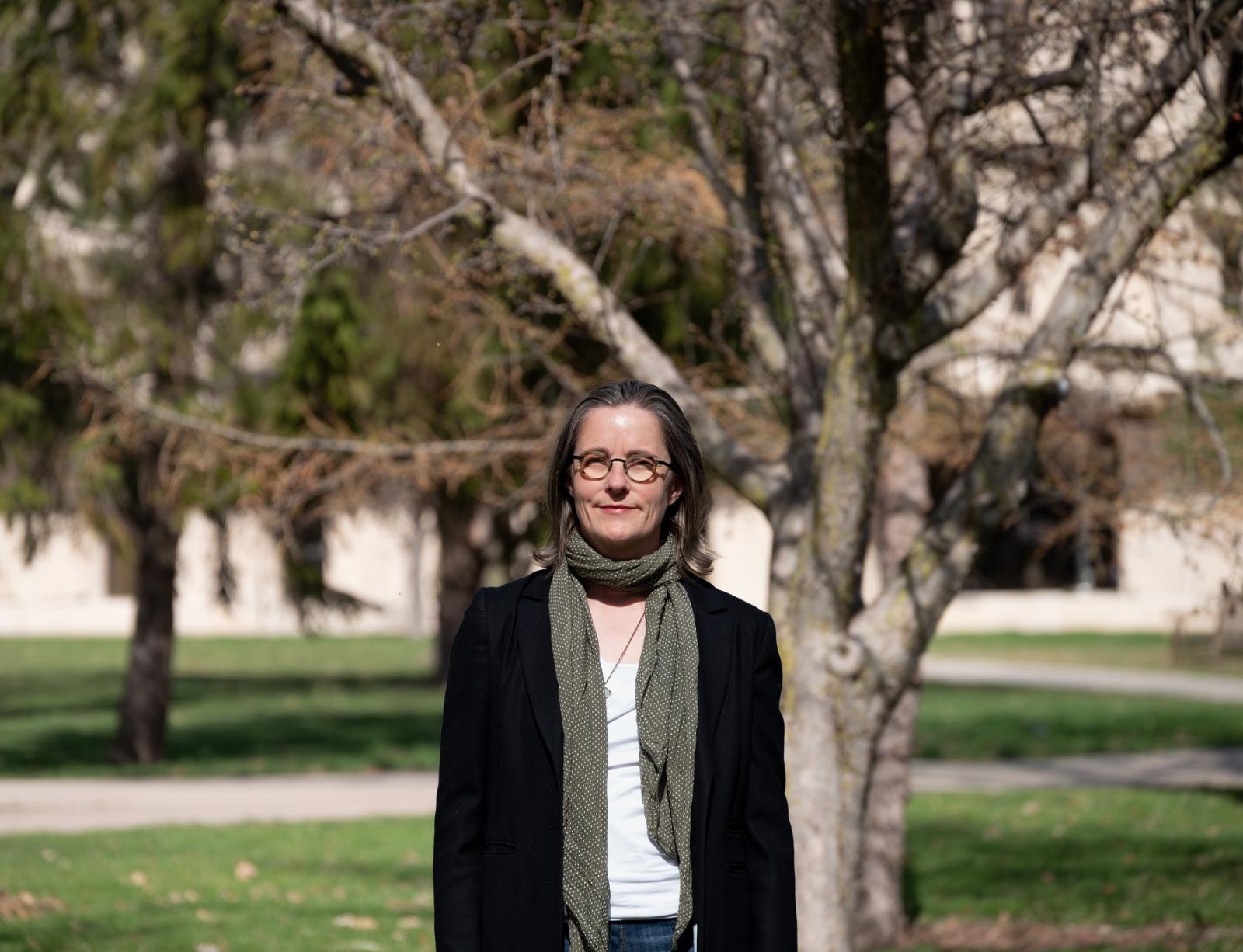About the series: On Main Hall Green With … is an opportunity to connect with faculty on things in and out of the classroom. We’re featuring a different Lawrence faculty member each time — same questions, different answers.
---
Jodi Sedlock, professor of biology at Lawrence University, has been immersed in fascinating research, mostly focused on bats, for more than two decades.
Her research has taken her and students frequently to the Philippines in Southeast Asia, where she has worked in collaboration with Filipino scientists, conservation professionals, Chicago’s Field Museum of Natural History, and other researchers, often in forests, caves, or biodiverse rice fields, as she seeks to better understand how bats respond to human-caused landscape changes. Her recent focus has been on acoustic ecology, a subfield of sensory ecology, using ultrasonic microphones to “eavesdrop” on bats as she explores animals’ evolved strategies for living in naturally noisy environments.
In 2021, Sedlock's research was featured on the cover of Functional Ecology.
Whether focused on ecology, microbiology, marine biology, or genetics, you will collaborate with faculty and peers on co-designed research projects.
Sedlock joined the Lawrence faculty in 2002. She earned a Bachelor of Fine Arts and a Bachelor of Science in biology from Loyola University. She earned her Ph.D. in ecology and evolution from the University of Illinois.
We caught up with her to talk about interests in and out of the classroom.
In the classroom
Inside info: What’s one thing you want every student coming into your classes to know about you?
I’d like students to know that doing creative work and sharing it is scary for me, too. Often, my mind wants to convince me that other scientists, artists, writers, whatever, just wake up in the morning with complete confidence in the fact that they are going to crush it that day—develop a novel and fundable hypothesis, write a poignant and award-winning poem, or deliver a presentation without a hitch. Occasionally, I allow myself a vulnerable moment and confess to a colleague that fear has been tossing me around like a chew toy in the jaws of a pit bull—only to learn that they, too, have these moments, daily. I’d like students to know that they are not alone, and that if they are willing to share their struggles with me, I am happy to share mine, and together we can move on with the business of learning and doing.
Getting energized: What work have you done or will you be doing at Lawrence that gets you the most excited?
Recently, I launched myself into the field of experimental sensory ecology, which has reignited my love for research. In 2019, I designed and deployed a 100-ultrasonic speaker array in an irrigated Philippine rice paddy to test the hypothesis that the impressively intense ultrasonic chorus produced by an aggregation of tiny insects deterred foraging bats (it does). Next year on sabbatical I plan to deploy a prey cue array in a tropical understory to test whether katydids masquerading as leaves dupe not only visually orienting birds and lizards, but also echolocating bats. Are echoes returning from a leaf-mimicking insect leaf-like? These projects involve engineering, art, and science—they’re very interdisciplinary, which I love.
Going places: Is there an example of somewhere your career has taken you (either a physical space or something more intellectual, emotional, or spiritual) that took you by surprise?
I’m presenting moth behavior research at the International Entomological Congress in Kyoto, Japan this summer. This is surprising given that I am a bat biologist. During the COVID pandemic, I was eager to continue testing hypotheses about ultrasonic katydid choruses’ effects on other ultrasonic hearing animals. Given travel restrictions, I turned my attention to lab-based experiments on moths, specifically those that both possess simple ultrasonic sensitive ears and are crop pests. Over the past two years, and with the help, focus, and creativity of several Lawrence students, we’ve learned that intense ultrasonic insect sound—typical of rice paddies and wet meadows—reduces egg laying, and when less intense, may attract dispersing moths.
Out of the classroom
This or that: If you weren’t teaching for a living, what would you be doing?
I would be doing conservation work. After earning my Ph.D., I stood at a fork in the road—take a short-term opportunity leading me into the world of wildlife conservation or an academic career. I obviously chose Lawrence but would have been just as happy spending more time in the field and working with communities living adjacent to wildlife—working to make it possible for people and wildlife to coexist. I love diversity—among people and other species—and think bringing these realms into coexistence is incredibly important work.
Right at home: Whether for work, relaxation or reflection, what’s your favorite spot on campus?
I love walking down by the river. It’s a 20-minute loop—down Lawe Street, along the river, up Olde Oneida, and past the tennis courts back to my office. Walking the “river loop” helps me stretch out physically and mentally by attending to sounds and sights beyond the frame of my computer monitor. Winter walks promise visitors from the north—buffleheads, golden-eyes, and diving mergansers, and the Lawe Street bridge-dwelling cliff swallows and white pelicans are welcome harbingers of summer during late spring.
One book, one recording, one film: Name one of each that speaks to your soul? Or you would recommend to a friend? Or both?
Book: Ed Yong’s Immense World: How Animal Senses Reveal the Hidden Realms Around Us, because he eloquently reveals our limited experience of the world and challenged me to imagine the world through eyes, ears, lateral lines, electro-sensors, etc. of other creatures. I used this book in my Animal Behavior course, and the students loved it, too.
Recording: Patty Griffin’s song, Heavenly Day. Sometimes I’ll listen to this multiple times in a row. It reminds me to be grateful for today and for everything and everyone in it.
Film: I loved the documentary, My Octopus Teacher. It demonstrates the intimate connection that can be formed with another species, especially a wild animal. Some of my most precious life experiences are being noticed by a wild animal. Once, a palm civet ran down a tree and sat in front of me, head cocked to the side, to inspect my headlamp—what a thrill to be the object of its curiosity.
See more faculty profiles in the On Main Hall Green With ... series here.

